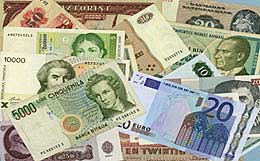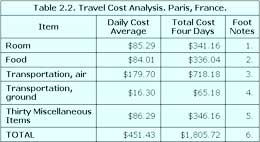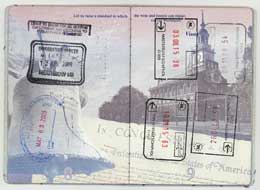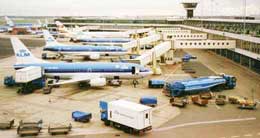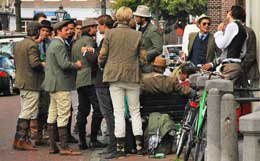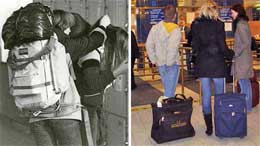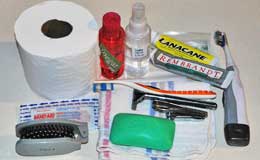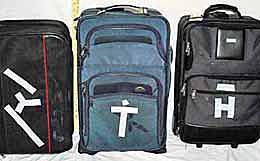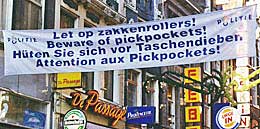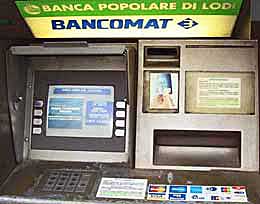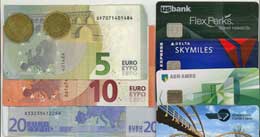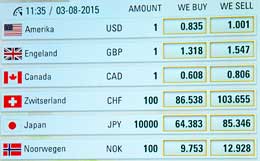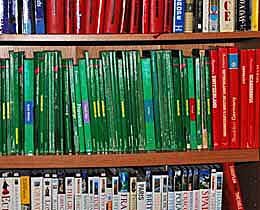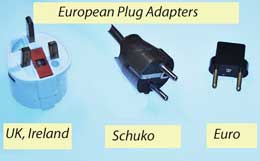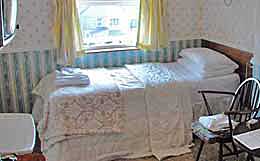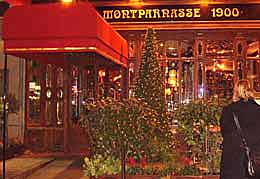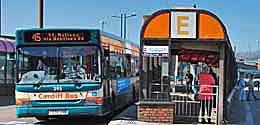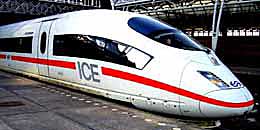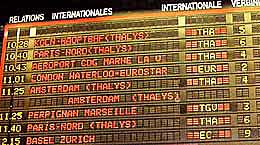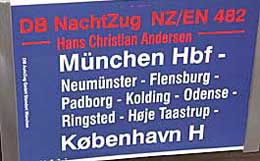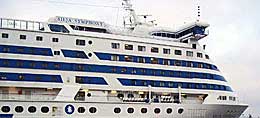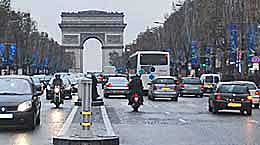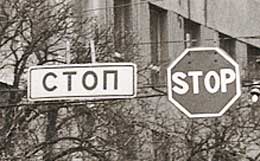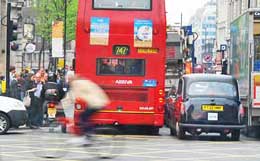Customs Duty EU UK US
Know the Rules when Crossing Borders
Alcohol, tobacco, perfume, food, laptop, $10,000, embargoed items, baksheesh, go to jail.
After you have cleared Passport Control and retrieved your luggage you proceed to Customs Declaration. Here are your choices at Amsterdam's Schiphol Airport, the main air entry point for the Netherlands, a.k.a. Holland. If you want to stop and read that poster on
the wall giving you the rules of the game, be my guest. If you are in a hurry to get a cold Dutch beer down your gullet you can just walk through the door with the green square above it posted Nothing to Declare.
Checkpoints are often posted as "douane" which is the French word for customs.
Carpe diem. Vivere bene! Gratia Deo.
This is chapter 25. The entire book is published free on-line by the DIY traveler, author, photographer, and webmaster —yours truly— with help from my daughter Stephanie and good friend Paula in Haarlem, Netherlands. Questions, comments, complaints, and contributions are welcome. Please click footnote. Patronage at my euro-shoppe™ keeps this site on line. Updated .
Thou shalt not smuggle.
WHAT IS CUSTOMS?
I Declare
When entering most countries around the world, after showing your passport to the armed border police, you are confronted by armed customs inspectors. They have nice pistols. "Do you have anything to declare?" is the vocabulary of these men and women. You're thinking, "Declare? What does that mean?" The short answer is: "Are you carrying anything for which you must pay a customs duty?"
Eh? What is a customs duty? Customs duty is a tax imposed on goods brought into a country. The customs inspector is there to ask questions, snoop through your goods, make a determination as to whether or not you should pay a tax, and to collect the tax. Since the customs inspectors are packing heat and have a SWAT platoon on call and you only brought a pea shooter, this is not the time to put up a fight. Just do as ordered with a smile. In a few of the eastern countries the inspectors will accept baksheesh in lieu of the tax. See my experiences below, but also see Darnal's comments on baksheesh before you try this. It could backfire badly.
Sword or Firing Squad
The customs inspectors are also there to prevent entry of certain contraband. You know what I'm talking about. He can search your suitcases and pockets. His dog will walk all over your stuff, sniffing and sniffing and sniffing. I have witnessed this a number of times at border crossings in Europe. The customs officer will detain you if poochie finds anything illegal. Maybe you think that you are smarter than poochie? Well, maggots are smarter than you when it comes to finding food, and I have witnessed that also.
You've seen the movies and the news. Do not be a fool. If you hear the sargeant shout "Fire!" you are out of here. It reminds me of that movie, "Treasure of the Sierra Madre." The convicts had to dig their own holes before the final order. That movie has the best you'll ever see of Humphrey Bogart, or any other actor for that matter. He is the cream de la cream.
EUROPEAN CUSTOMS
I over dramatised the firing squad paragraph. That stuff only happens in certain Islamic nations and North Korea. In Europe the rules and penalties are much softer, but still there are rules and penalties which can bring on severe collateral consequences. You will not like the consequences.
The Green Door
On entering Europe and again at some border crossings, not many any more, you will be asked if you have anything to declare. Sometimes the question is asked in person and sometimes the traveler has a choice of passing through a gate marked NOTHING TO DECLARE (Green) or one marked SOMETHING TO DECLARE (Red). The signs at these gates indicate what must be declared. Unless you're carrying something that your mother would not approve of don't bother stopping to read. Just walk through the green door.
Border crossing formalities within the European Union have vanished. The borders are open and everybody and everything can pass through without control. The European Union includes most of western Europe. See Prime Travel Data: Elementary Travel Information for Europe for more information.
Traveling into eastern Europe is another ball game. Customs police are just as likely to search you when leaving as when you are coming in. It seems that the rules are what the border guard wants them to be. A little gift for the guard has been the rule for decades.
Smokers and Drinkers
If you are flying in from the USA or another non-EU nation it is good to know what you are allowed to bring in duty free. In general, the only items of concern to European Customs (a.k.a. Douane, Zoll, Toll, etc.) agents are alcoholic beverages, tobacco products, and perfumes. And in general the limits are one liter of distilled spirits or two liters of wine, 200 smokes, and two ounces of perfume. Check the web site for the customs service of the nations you are visiting for the latest information. Countries may have different limits, but unless you're carrying around a six pack of Scotch whiskey, don't worry about it. The "smokes" refers to regular cigarettes. Other types can land you in the local jailhouse.
Even before the borders were opened I made maybe 300 crossings by car, train, plane, and even foot. I never declared anything, and only had half a dozen episodes with customs police. On going through the green door entering Ireland, I was questioned for a moment by the guard. On entering Spain, my suitcase and briefcase were searched. Spain has had a problem with terrorists associated with the Basque nationalist movement for decades. Another event was on leaving France, not entering. On leaving the Ukraine both times I had minor delays. Entering Romania and Turkey presented inconveniences, as did a return to Italy by boat from Greece. These folks are just doing their job so make it easy for them and they will reciprocate.
Carrying Cash
At one time the French prohibited anyone from taking more than 5,000 francs out of the country without permission. I was asked several questions on a train, but two men from the Middle East were subjected to luggage and wallet searches. Other countries which had strict enforcement of laws against currency export were Italy, Portugal, and Greece. This is history now that these nations are part of the European Union and they all use the euro. At least they use the euro as of February 2015. It seems that the currency has changed but the idiot free spending politicians have not. Some of these countries had a chance of being booted out of the Euro Zone due to socialist mismanagement of their economies. Greece is still teetering on getting the boot. Introduction of the euro and bank cash machines have been the two best improvements in Europe since WWII.
Currency controls may still be in effect in some of the eastern countries. I once smuggled a pack of nice crisp 25 ruble notes out of the Ukraine. I'm sure the customs agent saw them in my briefcase on his high powered x-ray machine because he opened the briefcase and began a slow search. I slipped him a cigarette lighter, one of those that my company gives away as an advertising item, and that was the end of the search. I still have that Lenin-face paper and he has his baksheesh.
On leaving Romania, even though it is against the law to take any lei out of the country, the official exchange office would not accept their own stuff back. I had to change it at a motel in Hungary at a deep discount.
I was stopped by the customs police while leaving Hungary with more than their limit of cash. I talked my way out of that one by explaining that I had intended to buy some food on the train, but there wasn't any food available. That was the truth. Getting food at the station in Zagreb almost turned into a nightmare, as discussed in chapter 17, Night Trains in Europe: Sleeping City to City. But some Russians on our train from Budapest to Zagreb never made it to their vacation destination. Because they did not have the required minimum of $200 in western hard currency with them the Yugoslav customs police removed them from the train and sent them back to Hungary. The Hungarian rail workers on the platform were beaming with delight at the fate of the Russians. The bloody 1956 Russian invasion of Hungary is still remembered. The beginning of the student demonstrations on October 23 is marked as a national holiday. Russia sent in tanks, bombers, and troops. The citizens of Budapest were throwing Molotov cocktails onto Soviet tanks below their apartment windows. Thousands were murdered by the Russian communist army and a quarter million were relocated or imprisoned.
The United States has a cash and negotiable instruments limit for travelers. See the section $10,000 below.
Hard Cash
All European governments can impose minimum financial requirements on visitors. If you do not have a return air ticket and/or money to support yourself you can be denied entry to any country. The local citizens do not want another free loader milking their generous welfare system.
Out in the Wild Wild East
Another fun encounter with customs agents happened when I left the Ukraine the first time. Exporting any kind of art was a no-no in the former Soviet Union. I had bought a painting directly from the artist in a Kiev metro station. You could still smell the paint it was so fresh. The customs officer picked up my painting to impound it. Protests of my hosts and a cigarette lighter in his palm changed the agent's interpretation of the law. I was allowed to leave Kyiv (formerly spelled Kiev) with the painting. It is now hanging in my hallway.
A year later they gave the trunk of my car a good look as I was driving out of the Ukraine, but nothing was found to cause a delay or require a payoff. I recall buying a rather unique sword somewhere in the east. It was buried under all the other stuff in the trunk of the car and the officer didn't find it.
While Elizabeth and I waited six hours at the Bulgarian - Romanian border we had time to talk with a number of other travelers. One fellow from Moldova demonstrated the correct way of avoiding curious questions and expediting your passage through eastern borders. He mounts a bottle of cheap perfume on the steering column just below the speedometer. The guard would just reach in, help himself, and wave the fellow through. I heard that it was Kent cigarettes in the old days.
Corrections from an Official EU Customs Inspector
In September 2015 I had an email from a fellow named Darnal. His introduction is "Doing some research for work made me stumble upon your "Customs in Europe" page (http://www.enjoy-europe.com/hte/chap25/customs.htm). It was an amusing read, I like your writing style. However, there are some things that I would like to address, being an EU customs officer myself. Some are small corrections or points of view, some are updates to information that has changed. Since your page says updated 25 July 2015 I thought I would bring some things to your attention." Here is the body of Darnal's email, leading off with his answer to the answer I gave to the question: "Declare? What does that mean?"
It means "Are you carrying anything for which you must pay a customs duty?"
This is not entirely correct. For one example I would point to the obligation to declare cash over 10,000 euro. There is no duty to be paid for it, no cost whatsoever, just the obligation to declare. Other items may also have to be declared, even though they are perfectly fine and no costs will be charged. The CBP gives an extensive list but one sentence I read I found particularly handy: you must report all goods you are bringing back that you did not have when you left the United States.
Of course for tourists to Europe this does not completely apply but it does give you an idea. For example some of the questions frequently asked by me are
-questions regarding to dutiable items like alcohol and cigarettes
-questions regarding food items or animal products
-questions regarding cash, cheques etc
-questions regarding gifts or items that come from outside EU but are to stay in the EU (for example if you bring an Ipad from the US as a gift to your son who lives in Belgium)
-questions regarding medicine (some have to be declared and doctor's note provided)
-questions regarding cosmetics
Of course items that are not allowed cannot be declared but it is always best to "declare" when in doubt.
Unless you're carrying something that your mother would not approve of don't bother stopping to read.
Well, as stated above, I think your mother would approve of cash, medicine, gifts etc, maybe just stop for a second and read... On the other hand, no such list is visible in the airport where I work...
alcoholic beverages, tobacco products, and perfumes. And in general the limits are one liter of distilled spirits or two liters of wine, 200 smokes, and two ounces of perfume.
The perfume is now no longer a part of the list and is added to the monetary limit of 430 Euro. Also the limits (I am assuming you were talking about a traveler coming from a non-EU country to an EU country) are different from the ones stated. You can find updated info here: Travelling - European Commission.
You may of course bring more than these limits, on the condition that you declare them and that you pay the tax and excise. If you do buy duty-free it is advised to carry these in the original duty-free bags past customs and not stash them in your luggage.
And one additional word of advise, offering baksheesh or items to a customs officer in western Europe will most likely land you in the interrogation room... or worse. ;)
These are just some of the things off the top of my head. Since I can imagine a lot of people read your well-intentioned and informative site I would like it to be accurate. You can of course always contact me for additional info or questions.
Thank you for the interesting read and I intend to read the other chapters once I find the time.
Greetings,
Darnal
Head's up. A good Customs officer is detail oriented. Even though I have crossed the borders in Europe hundreds of times, as you can see I am not an expert on European Customs. If you have questions I suggest that you follow Darnal's link to the European Commission.
I thanked Darnal and he replied with additional information in several more emails. I have added some bold font to highlight key words and sections:
About bringing medicine to Europe, some advise.
You are only allowed to bring in the amount of medicine required for the duration of your trip for yourself and your traveling companions. And of course with the prescription. So if you have a prescription for an illness and you need to take 2 pills a day that's it. If you're coming over for 2 weeks and you're carrying 4 bottles of 25 pills, be ready to have it confiscated.
First off, for airports I could not find anything about these few things, so I'll mention them anyway:
-Tax-free
I'm not sure if you wrote about it somewhere but I haven't found it yet. In the EU when you buy something that is intended to leave the EU and you are not a EU resident, you can profit from the VAT return system. Since I'm occasionally posted there at the airport I can assure you lots of people use it, lots try to fraud it, and it is certainly worth the extra stop at customs.
Since the goods are not intended for use in the EU paying the EU tax would be incorrect. Therefore you can reclaim the taxes paid when leaving the EU. Of course you then have to pay taxes in the country you do intent to use them in, something almost all people "forget". Fear not, on more than one occasion when you come to "detax" items we will inform our customs colleagues in the arriving country so when you choose the "nothing to declare" lane or answer no to the question, a hefty fine can be your welcome word...
Before buying in the store you must declare to the clerk that it is a tax-free purchase! Most stores have an agreement with Travelex/Global Blue or other firms and will then provide a special bill to present to customs and have the VAT returned at the airport/port. A simple store receipt is not acceptable. All to often I must explain to tourists that they would have had a vat return for hundreds of dollars if they had simply followed the rules. Unfortunately some stores themselves do not know them, so you get punished for their ignorance. If the store does not have Global Blue or other forms they HAVE TO provide a bill (factuur). This has to include your name, passport number and address abroad, the word factuur (depending on the language), the store info including VAT number and a detailed list of the purchased items and prices.
If you present yourself to customs with these papers, the goods, your passport and your ticket confirmation, the officer will stamp the documents and you can get your refund at one of the travelex offices at the airport (minus their fee which I'm told is as high as 51%!), or you have to send the bill back to the store and they will transfer the money. If you cannot present the goods, you cannot get a refund. If you have a residence in the EU, ibidem. All presented goods that you intend to put in your check-in luggage are to be shown to customs before checking in at the airport of departure. All goods that you intend to put in your carry-on have to be presented (and detaxed) at the last airport before leaving the EU. So for example you are flying from Frankfurt via Brussels back to the US, your check-in goods need to be detaxed in Frankfurt, the rest in Brussels. You can detax any EU papers in any EU country. I've heard stories of British officers refusing to detax bills from other EU countries saying they were not part of the EU. I have no words for that...
To clarify I'm using the "EU" simplistically. It would take too long to explain the differences between the EU, Schengen, the Customs Area, the Excise Area, The Fiscal Zone etc. Some (parts of) countries are part of some of these but not all. So your departing airport may be part of the EU and Schengen but not of the other. It may be part of the Customs Area but not the Excise Area, etc.
Each country also has a minimum spending limit per bill, so for Belgium that's 125 Euro, Netherlands is 50, etc. If the bill is lower, you cannot get a refund. Since for Belgium most taxes are 21% it means you get 1/5 of your money back by simply passing Customs.
-Baggage labels
Do not take off baggage labels in airports before leaving Customs. Preferably only take them off at home or the hotel. Since some airports do not have different exits for intra-EU and international flights this label is the proof of your origin. If you have a green edged label, meaning you are taking a flight originating within the EU, mind your label! Since these labels are essentially "laiser passez" they are worth a lot to the wrong people. They can get stolen on the baggage belt, they can try to offer you money for it (I've heard prices of up to 50 Euro, dropping to 5 in the (gullible) tourist season). If you get your bag off the belt without a label or someone wants to have/buy it, alert customs immediately. However, most times smugglers don't even have to bother. The garbage bins are easy pickings and thrown away green labels are everywhere. Frequently we stop smugglers that are "re-using" labels trying to avoid controls. A lot of times they claim to having been asked to help the owner of the label (and therefore the bag) to carry it outside since his/her cart was too full. Where is the owner? Probably already left. His word against yours of course and in the case of drugs/cigarettes this could be a nasty beginning of your trip. Remember also to never agree to carry anything for someone past customs.
-US visitors It is true that visitors coming from high security countries (like the US) are less likely to be controlled than most. However, frequent US visitors have adopted a casual attitude to this, carrying their US passports like a badge, casually waving it at every official and even getting annoyed when stopped. Often they try to just keep walking, not even looking at you and just saying something like "US" or "American". Those types of people usually enjoy a prolonged stay and a taste of customs hospitality. Some respect is due...
My personal experience with US citizens is overwhelmingly positive. They are commonly very polite and cooperative and have a respect for the need for checks and security. However, as described above as one example, some exceptions do occur.
One thing of note I want to add, since I have often tried to explain this to US citizens that are caught (usually for money, tobacco or new brand clothes). You do not enjoy the US rights when you are in Europe! You enjoy the same rights that every other passenger enjoys. Most of these are EU rights. Some are country specific.
Your Rights Without Being Detained
Your Rights When Being Detained.
These are EU rights and MUST be given to you before any interview involving offenses. Some noteworthy things are: Unlike in the US you do not have to be read your rights and therefore things that you said to any officer at any time are admissible. Some smart-ass confessed and then tried to call it a procedural mistake since I "didn't read him his rights..."
You do not have the right to call your embassy before or during an interview. Either you are not detained and can either just walk away or wait until the paperwork is done and then call. Or you are being detained and have the right to a provided attorney.
It is really a pity that of all nationalities I have encountered, the US are by far the most troublesome. Especially since the overwhelming majority are the complete opposite and it's just the few bad apples. You got caught, just fess up and pay the fine. Don't think threatening with your embassy will save you.
Also the "US custom" of asking for a supervisor is really, really annoying. Of course you have the right to ask for a supervisor if you feel you are being treated unfairly. You can request this if the attitude of the officer is in question, but not because you don't agree to the fine. If I find 5 cartons of cigarettes in your bag and you did not declare them you will get fined (if you are lucky, normally it's worse). Why on earth would you start bargaining with a supervisor, the fines are fixed by law! The record was one women that requested a supervisor 4 different times. She asked, and got, my supervisor, his shift supervisor, his service chief, her station manager. Finally we halted the charade or eventually she would have asked for the minister of Finance.
Carry a copy of the bill for all expensive items like laptops, camera's etc. This proves they were bought outside the EU, if you are carrying a substantial worth in devices, present to customs and ask to document your arrival. This way there is no doubt you are going to leave them in the EU, avoiding paying taxes. For customs, when we doubt, we are right and you have to prove I'm not. It's a small price to avoid long arguments with a fatigued and irky customs officer ;)
Also I forgot in my mail about detax, some countries have two-stamp forms, requiring you to present your goods to customs on departure for the one stamp, and in the arriving country for the second. This ensures the goods really leave the country.
You may not buy 4 items of the same to sell/give to friends at home. Only personal purchases can be detaxed, from 4 on up is not considered personal.
Darnal had comments on other subjects as well and I will be adding them to the appropriate chapters. Thank you Darnal!!!
One big take-away from Darnal's message is that the Unted States Constitution stops at the border. Except for the IRS. You still have to pay income tax and Social Security tax wherever you are and for how long. The United States is the only country in the world with this draconian law.
UNITED STATES CUSTOMS
Notwithstanding all that Darnal presented, my experience is that there is a difference in the treatment given to Americans by United States and by European customs agents. Americans are presumed to be tourists over there, and tourists are usually given a hearty welcome. Border inspections are rare and not especially thorough.
Coming home though, be prepared for more. Returning to the United States will probably be the most traumatic experience in your travels, thanks to Uncle Sam's Customs Service and so-called Homeland Security organization. These folks are very curious, and non-compromising.
Before You Go
To ease the shock of re-entry the Customs Service has produced several guides for international travelers. The page America's Gateway has links to further information and publications detailing many of the laws and regulations enforced at our borders. It looks like a committee of lawyers wrote that stuff, so good luck. Unfortunately the handy PDF file titled "Know Before You Go: Regulations for International Travel by U.S. Residents" appears to have been discontinued. You will have to search through a number of on-line pages to find whatever interests you. Also, the Federal Government changes their web site so often that it is not convenient to find anything. Have patience and perseverance. Vote the rascals out. Get new rascals.
It would be nice if the State Department would print the old "Know Before You Go" pamphlet and send a copy every time they mailed out a passport.
I'll briefly summarize some of the information from the governmment Know Before You Go web page in the balance of this chapter. However, there are many exceptions to this general summation and the information seems to change frequently. So go to the web page and read the whole story from the original source.
Landing Card
Traditionally, on returning to the USA you must fill out the "Customs Declaration" form while still in the air. On this card you declare the value of everything purchased or given to you while outside the country, including used items. Even the value of repairs made on personal items is dutiable. No joke. I wonder if they charge duty on surgery you have done overseas. Budapest is reported to be a center of high quality and low cost dental work.
After having passed Passport Control you surrender your filled out "Customs Declaration" form and passport to the Customs agent. You will then be asked where you have been, why, and for how long, all the while being given the most unwelcome look-over you've had since the day you forgot your lunch money in first grade. Do not lose your cool.
There have been changes in procedure for some flights to the USA. On my return to Detroit in September 2015 landing cards were not distributed by the flight attendants. Instead there were several tactile screen machines with a passport scanner and Y/N questions. Oh boy I thought, this is going to be a doozie. But, there were only four simple questions and I just touched the screen to answer.
Ironically, landing cards were distibuted on the connecting flight I made from Amsterdam to London. The stewardess said that I must fill it out. I did not. Nobody in London asked for it.
USA Passport Check
I also had to hold my head in a certain position in front of the machine which scanned my passport. Then it took my photo and compared it with my passport photo. I was good to go and return to the USA in less than a minute.
Preclearance
Stephanie returned to Los Angeles from Dublin in August 2015. There is a whole new system in place for that route. All passengers were required to clear US passport control and US Customs in Dublin before boarding the silver bird. I do not know if this is a "beta" for a universal roll-out of this procedure or just a one-off effort between Ireland and the USA. Stephanie was surprised, as I'm sure many others were also. But they presumably saved time getting out of Los Angeles airport when the plane arrived.
The U.S. Customs and Border Protection Agency page Preclearance Locations has the lowdown on Dublin, the only European city with this service. There are about a dozen others, mostly in Canada and the Caribbean.
Agriculture
One of the questions on the "Customs Declaration," whether paper or touch-screen, asks if you are carrying foods and plants with you. If you answer yes the customs inspector will write a big A on your declaration and direct you to a line for further questioning by Agriculture Department inspectors. I missed the questioning phase on a prior return to Detroit because the Dutch cheese I had was in the bag that the airline lost. They weren't interested in the Dutch cigars I declared.
By the way, most cheeses can be brought back to the USA. However, milk and milk products can not be brought to Europe. Check the links in Darnal's report above.
Duty
The general rule is that goods with a total value of up to $800 enter duty free. This is your personal exemption. Everything above that is assessed at approximately 3%. But be aware that your duty free alcohol allowance is one liter. If you bring back more than that you are assessed 3% plus Federal alcohol tax. There are other exceptions to the general rule so if you have something special in mind check with Customs before you come home with it. The duty on certain items from some countries in Europe is equal to the price you paid, in effect a 100% duty.
Embargoed
There are many things which are not admitted to the United States, and many other things on which there are restrictions. These are long lists, and subject to change by the Treasury Department and other federal agencies whenever they feel like it. Before going overseas, request copies of the current regulations. Items with important information are:
- Top Ten Traveler Tips
- Trademark Information
- Importing a Car
- Pets and Wildlife
- GSP & the Traveler
- State Laws on Importing Alcoholic Beverages
You will be surprised at the lists of restricted and prohibited items. It's better to be surprised by reading these web pages before you go. If you come home and proudly show the Customs inspector a valuable tourist trophy which happens to be on the prohibited list you will make his day.
Things change now and then. For example, Executive Order 12959, stated that as of May 6, 1995 the United States prohibits U.S citizens from purchasing goods made in Iran. This order specifically mentions those beautiful carpets and the prohibition also applies to American citizens living outside the USA. I guess that former President Bill Clinton intended to have the FBI go into every bedroom of every American around the world looking for carpets and their certificates of origin? And don't forget, President Kennedy's prohibition on Cuban cigars is still in effect 50 years later. He and his buddies stocked up before he signed the order. Maybe cigar lover Obama has reversed this order. Wow, that he did as of October 2016. He proably felt guilty about filling up Air Force One with cigars when he went to visit the dictator Castro earlier in the year.
Anyway, when you're in Istanbul shopping in the Bazaar check the labels. Don't believe it when the seller tells you that a fake receipt will fool US Customs inspectors. Maybe not.
Customs will seize personal computers and software which violate United States trademark and copyright laws. CDs made in communist China containing tens of thousands of dollars worth of software are on sale in many places for less than $20 each. These CDs violate US and all international copyright laws. The CDs can be seized by any customs official.
Music CDs and DVDs can also be confiscated if they violate US copyright laws. Music CDs will apparently work in any CD player. However, DVDs sold in some countries can be played only on DVD players sold in that country or region. There are six DVD regions in the world. European DVDs will not work in American DVD players. See the discussion of this topic in the TV section of chapter 22 part 1, Moving to Europe: Things to Know Before You Go.
Avoiding Double Duty
Some of the things you packed and brought with you overseas were made outside the USA. For example, most cameras are made in Japan or another Asian country. If you do not present evidence that foreign-made items which you already own were purchased in the United States, or that duty has already been paid, you might be required to pay duty a second time when you come home.
Carry the original receipts for all foreign-made articles which you own. If you do not have the original receipt for a foreign item purchased in the United States, or for which you have previously paid duty, fill out a Customs declaration form before you leave the United States. The declaration can be made at the customs office in any international airport.
If you are planning tight connections before boarding for Europe, contact Customs beforehand to find out where this can be done near your home. Only items with serial numbers can be registered. Cameras, camera lenses, laptops, and most electronic items have serial numbers. If you can't find the s/n on the back, look inside the battery housing.
Go Directly To Jail
Attempting to bring contraband home is foolish. At the very least, the stuff will be confiscated when found. Depending on the item, possession may land you in the federal slammer, right now.
If you declare an item at less than you paid for it, be ready to be found out. Customs agents see thousands of items in a week. They know the prices as surely as your mother knows the price of lettuce. Some famous citizens have been caught making false declarations and have paid magnificent fines according to news reports. US Customs says that it seizes a million dollars in cash and two tons of drugs, every day. They confiscate plenty of other stuff also, and send a lot of people to jail. Do not be stupid.
Your Laptop Computer
As of January 2014 a Federal Court has approved continuing searches of personal computers coming into the United States. The Customs Service can take control of your machine for minutes or months and have their way with it. If the NSA hasn't already secured all your personal business in their fat computers they will have the opportunity now.
How do you deal with the possibility of being without your computer when it falls into the hands of a government agency? The answer is simple — backup. Have a backup of all your files on a flash drive. Bring it with you from the United States so you are not required to declare the flash drive when you return. I know a guy who carries a few of them on a neck chain under his shirt. You don't get a body frisk or scan when you return to the USA, at least not yet. You will be scanned when you board in Europe so throw the flash drives into the bin with your laptop, clear the scanner hands up pockets empty, and put the chain of flash drives back on under your shirt. Remember, pockets empty means POCKETS EMPTY. That scanner machine finds everything.
Booze
Even though United States Federal law allows wine, beer, and liquor to be imported, all states have their own laws on import of alcoholic beverages. Many of these laws are more restrictive than the Federal law which allows one liter of alcohol duty free, if you are at least 21 years of age. United States Customs enforces state alcohol laws. General information on these laws is presented in one of the United States Customs web pages linked above.
Also, call your state alcoholic beverage control board and get specifics before you go if you plan to purchase a case of wine. If your return flight lands in another state you must satisfy the law of that state when clearing Customs. Some states prohibit importation of all alcohol, without exceptions. Liquor distributors have powerful legislative lobbies that make sure they receive their bounty on every bottle of beer sold in their states.
$10,000
When entering and leaving the United States, there are other restrictions by various Federal agencies which are enforced by the Customs Service. Customs says that it enforces some 4,000 laws administered by 40 federal agencies.
One of the regulations is on money. If you are taking more than $10,000 in currency or negotiable instruments out of the country our Big Brother in Washington wants to know all about it. There are no limits on what you can bring (this can change) but you must file a report with the Treasury Department if you have more than ten grand in your pockets. You must also file a report if you are coming home with more than $10,000. If you are over the mark and do not declare it Customs will put your loot in their pocket. As noted above, the Customs service brags about how much money they confiscate every day. It is something to brag about.
This law was put into effect ostensibly to stop the flow of money attributed to illegal drug trafficking. Are they serious? Anybody who can smuggle drugs into the country can surely smuggle money out. Why don't they just let the grass be grown at home and help our balance of trade? This is a no-brainer. Colorado, Washington, and Alaska citizens have their mind straight on this issue, and business is booming. Not only do these states collect sales tax and income tax on profits and wages of legal grass growers, they also save on the costs of arresting, prosecuting, and jailing folks who want to have a friendly joint now and then. Is everybody else totally clueless? By the way, I don't toke and haven't even seen a joint in decades, except in the Netherlands. Normally I am a wine guy. See German Wine Labels: Taste and Spit.
Please note Darnal's information above. The EU requires that you declare to Customs if you are entering Europe carrying more than 10,000 euros. Just like the US law, there is no restriction or duty. Their Big Brother just wants to know. If you do not declare the cash it will be confiscated. Oops, there goes the vacation, maybe the retirement home. Remember, it's not just cash you must declare. It is anything resembling cash. I recently received an email from a woman in England whose man was being detained at Amsterdam's Schiphol Airport for failure to declare a substantial quantity of gold.
Have a good trip!
Selections at
#E-010
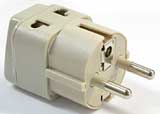 Grounded Universal 2 in 1 Plug Adapter
Grounded Universal 2 in 1 Plug Adapter
European Schuko plug.
4.8 mm prongs.
Equivalent to type E and F.
You can use this ungrounded Euro plug in many European countries.
#E-020
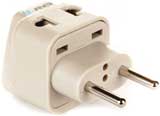 Universal 2 in 1 Plug Adapter
Universal 2 in 1 Plug Adapter
Euro Plug
4.0 mm prongs.
Equivalent to type C.
A universal plug adapter for the UK and Ireland.
#E-030 hhh
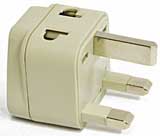 AC Adapter Plug for use in England, Scotland, Wales, and Ireland
AC Adapter Plug for use in England, Scotland, Wales, and Ireland
Equivalent to type G.
Here is the Swiss version.
#E-040
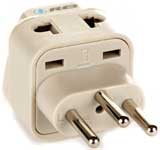 Grounded Universal 2 in 1 Plug Adapter
Grounded Universal 2 in 1 Plug Adapter
Type J for Switzerland
Here is the grounded Italian model.
#E-050
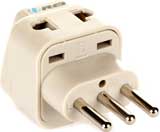 Grounded Universal 2 in 1 Plug Adapter
Grounded Universal 2 in 1 Plug Adapter
Type L for Italy
Note: The highlighted #E number is arbitrary. It is meant to help identify products in this advert page when you write in for electrical advice.
This 110-250 volt power surge strip has three universal outlets and an American grounded plug so it needs a plug adapter for the countries you are visiting. Make sure that all your gizmos are rated for 110-240 volts.#E-060
 SM-60 Universal 3 Outlet Power Strip Surge Protector for Worldwide Travel. 110V-250V with Overload Protection.
SM-60 Universal 3 Outlet Power Strip Surge Protector for Worldwide Travel. 110V-250V with Overload Protection.
For charging up to six gizmos at a time use this 250 volt universal power strip. It comes with a grounded Continental plug.
#E-070
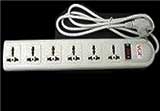 Surge Protector
Surge ProtectorPower Strip
6 Universal Outlets
220/240 Volt 50/60Hz
If your gizmos charge through a USB port this can keep you going. European cars have the same 12 volt system as American cars.
#E-200
 Scosche Dual USB
Scosche Dual USBCar Charger
This 50 watt transformer changes 220 V electricity to 110 V. It works for small devices up to 35 watts continuous service, if they can operate on 50 Hz which is true for many battery chargers. Check your electrical nameplates and refer to chapter 11 for further information.
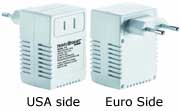 50-Watt International Transformer.
50-Watt International Transformer.
Travel Smart by Conair.
For small appliances this transformer will suffice in many cases. It is rated at 200 watts. However, in continuous service it would be best to use it on appliances needing no more than about 100 watts.
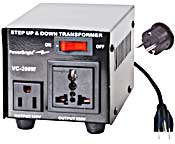 Step Up/Down Transformer
Step Up/Down Transformer
120/240 volt 200 Watt
by Power Bright
Absolutely the best battery for digital cameras which use AA batteries.
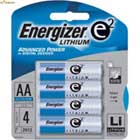 Energizer
EnergizerAA Lithium Batteries
4 Pack
HOW TO EUROPE
The Complete Travelers Handbook
Chapter 1
What's It All About?
Travel Like a Native In EuropeChapter 2, Part 1
On Budget in Europe
Travel Costs: How Much?Chapter 2, Part 2
Europe on WHAT! Per Day?
My Actual ExpensesChapter 3
Passport and Visas
Identity and Travel DocumentsChapter 4
Flying to Europe
Travel Starts at the AirportChapter 5
What to Wear in Europe
Your Best Travel Clothesfor All Occasions
Chapter 6 Part 1
Pack Light Field Test
Travel Europe in Comfort and StyleChapter 6 Part 2
Personal Care Items
Pack Your Toothbrush, Toilet Paper, and Vinegar.Chapter 6 Part 3
Travel Supplies
Small Stuff Packing ListChapter 6 Part 4
Bringing Valuables
Not in Your Luggage or PurseChapter 7
Luggage for Europe
Pack Light, Let It RollChapter 8 Part 1
Pickpockets in Europe
They're EverywhereChapter 8 Part 2
ATMs in Europe
Machines Dispense Travel CashChapter 8 Part 3
Cash and Credit
Paying Your Way in EuropeChapter 8 Part 4
Money Potpourri
Cash, Coins, Transfer, BarterChapter 9
Your Travel Diary
Blog ItChapter 10
Europe Guide Books
Reviews of Tomes for TravelersChapter 11, Part 1
An Electric Converter in Europe
Why You ShouldNEVER Use a Converter
Chapter 11, Part 2
European Electricity
Outlets, Plugs, Converters, Adapters, Voltage, Power, Frequency, Watts.Chapter 12
Photography in Europe
Take Your Best ShotChapter 13
Bring a Smile
Travel Europe in Good AttitudeChapter 14
Hotels, B&Bs, Hostels, Homes
Travelers' Sleep OptionsChapter 15
Eating In Europe
Travel on Thy BellyChapter 16
City Transport in Europe
Bus, Streetcar, Subway, Taxi, Bike, Shoe, GondolaChapter 17, part 1,
Trains in Europe
A Rail PrimerChapter 17, part 2,
European Rail Stations
Finding Your WayChapter 17, part 3,
Night Trains in Europe
Sleeping City to CityChapter 17, part 4,
Boat and Bus Services
High Seas Ferry, Highway CoachChapter 18, part 1
European Auto Rental
Details and DocumentationChapter 18, part 2
Driving in Europe
Back Alley to Blazing AutobahnChapter 18, part 3
Driving Habits and Laws
Police, Speed Limits, TailgatersFor all 30 chapters and much more see
HOW TO EUROPE
The Complete Travelers Handbook
Free to use but not to abuse.
Copyright:
Internet edition
© 2001-2016 James J. Broad
All rights reserved. Tous droits réservés.
This is copyrighted material. Do not reproduce, copy, plagiarize, re-craft,
store, modify, extract, transmit, or purloin any part of this
publication in any nation in any form or by any means or for any purpose whatsoever without permission
in writing.
Copying:
You may print one paper copy of this web page for your personal use.
Permissions:
If you want to adapt any part of this material to use in your blog, forum, web site, book, article,
speech, term paper, movie, video, or any other media please write to me and get
permission before you do so. Otherwise it is a copyright violation or plagiarism.
Plagiarism includes paraphrasing text and copying ideas. Imitation,
the old saying goes, may be the highest form of flattery. However, plagiarism is outright theft and is usually
compounded by the lies of the perpetrator.
Everything on my web site is original, created at great personal expense
in time and cash in the course of my extensive travels throughout Europe. Please respect my property.
For detailed descriptions of the many forms of plagiarism see
Plagiarism.org and
A Plagiarism Guide for Students.
For permission to use material from this web site contact:
johnbermont@enjoy-europe.com.
Webmasters:
You may link the URL http://www.enjoy-europe.com/hte/chap25/customs.htm freely. Please do. When you link please send the URL for your linking page and a crosslink will be installed in one of the categories of the TRAVELERS YELLOW PAGES to your site if it has significant content for travelers in Europe.
Free, free, and free
This web site is totally free for everyone, and a labor of love for me.
Support
To keep enjoy-europe.com afloat I advertise scores of travel related books and products. My site receives
a commission from Amazon.com for all goods purchased through the advert links. These advert links are
displayed on individual pages and on my on-line store at
 . Your support is most gratefully appreciated. TIA.
. Your support is most gratefully appreciated. TIA.
Your Blow Back
I welcome questions, comments, and complaints. If you have any concerns about your trip to Europe that have not been covered well enough on my web site please do not hesitate to write. Ask, cuss, discuss, or whatever. I read every email and update my pages when I see a question repeating,
Utilities:
- How To Europe: The Complete Travelers Handbook.
- Home.
- To the top of this page
- E-Mail to John Bermont
- Meet the Author
- Privacy Policy
- Site Map
- Advertising Policy






